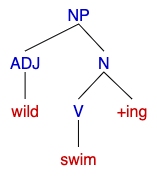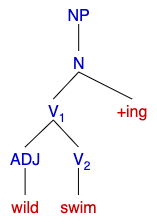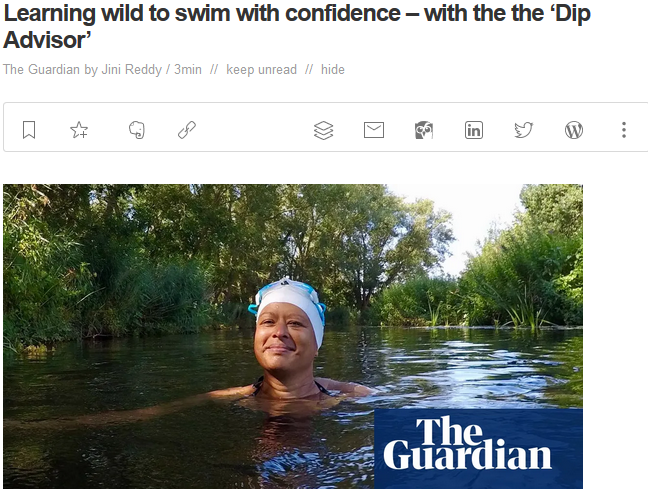Learning wild to verb
« previous post | next post »
David Denison writes:
This ludicrous headline in my Feedly feed caught my eye just now: "Learning wild to swim with confidence".
The actual story in The Guardian revealed an alternative version, usable but (to my ears) still in over-anxious thrall to the don't-split-infinitives mantra: "Learning to swim wild with confidence".
I think I'd have naturally said "Learning to wild swim with confidence", though with some hesitation in writing as to whether to hyphenate wild-swim.
Here's the obligatory screenshot, supplied by David:
The Guardian's sub-head makes it clear that the article is indeed about "wild swimming":
With most pools still closed, wild swimming is booming this summer, but what about those too nervous to dive in?
But it's ambiguous whether the morphosyntax of "wild swimming" is
 |
or |  |
or what — presumably David's hyphen is one way of signaling the second analysis. (Or at least the second constituent structure — maybe "swim" should be a noun in that case, as in apparent ADJ-initial compound verbs like "hotwire" or "slow-roll" or "fast-track".)
My guess would be that the article's author (it's credited to Jini Reddy) had the first analysis in mind — I doubt that she would have written "I've never wild swam before" (or "wild swimmed" either), though as David observes in the comments, that kind of thing is Out There.
But the writer of the headline in David's feed — and maybe the original headline for the article — started by transforming the idea of getting lessons about wild swimming into the shorter form "learning to wild swim". They then reflexively unsplit the infinitive by moving "wild" before "to". They swallowed the resulting ungrammaticality because the results of that manoeuver usually seem unnatural anyway.
Some previous "split infinitive" posts are here.
And by the way, "wild swimming" is apparently a thing, which is a little weird for those of us who never encountered any other kind of swimming until adolescence. As John Swindle notes in the comments, it's as if "wild walking" were used to mean "walking where there isn't a sidewalk or other paved path."

Philip Taylor said,
August 10, 2020 @ 5:41 am
For me (native speaker of <Br.E>), to "swim wild" would be far more idiomatic than to "wild swim" — the latter I would regard as an unnecessary and ugly neologism. I would cite as a model "Run Wild. Live Free".
JPL said,
August 10, 2020 @ 6:11 am
In the expression "learning to wild swim", "wild swim" would be a verbal element (and incipient compound), and "wild" would be a nominal element (cf. "pool swim"). An adjectival or adverbial "wild" would indicate a style of perhaps thrashing one's arms about furiously.
David Denison said,
August 10, 2020 @ 6:20 am
My daughter and son-in-law have familiarised me with the term 'wild swimming', almost always used with the verb 'go'. The question is whether, as with, say, 'home-schooling', the -ing form becomes so familiar that you get a back-formation to a verb 'wild-swim'. That's not natural for me (yet?), and I didn't do a corpus search to see if there were signs of it catching on.
David Denison said,
August 10, 2020 @ 6:27 am
Oops. I meant: 'to wild-swim' seems OKish. whereas '?*I wild-swam yesterday', '?*I've often wild-swum in mountain streams' are still uncomfortable for me, though others clearly can, as a Google search quickly reveals:
Although I’ve wild swum in a few places; in the sea when camping on the coast, in a lake when camping in the Lake District, I’m absolutely not a wild swimmer and I don’t have the confidence to just tip up somewhere and jump into a river or lake, even if I’ve read its safe/legal to do so.
DD
Andreas Johansson said,
August 10, 2020 @ 6:45 am
Reading a Swedish article about "wild swimming", they translate it as if "cold bath", but the text seems to say it's swimming outdoors, which obviously doesn't necessarily mean the water is cold. Colour me confused.
S. Valkemirer said,
August 10, 2020 @ 8:00 am
The (unstated) premise of the earlier posters suggesting better wordings is that the word wild must be retained.
But it need not. If the intended meaning is swimming elsewhere than in an indoor or outdoor swimming pool, "learning to swim in nature with confidence" will do.
John Swindle said,
August 10, 2020 @ 8:37 am
I read the article and wondered what wild swimming was. I figured it was probably a British usage. If, as S. Valkemirer suggests, it means swimming outside of a swimming pool, that's a pretty broad category of swimming. Like walking where there isn't a sidewalk.
I live in Hawaii, where you generally wouldn't be allowed to swim in commercial or naval harbors because of ships and admirals and stuff.
Gregory Kusnick said,
August 10, 2020 @ 10:09 am
If we were talking about outdoor dining, (almost) nobody would say "to outdoor dine". The overwhelming choice would be "to dine outdoors". So I see no reason to prefer "to wild swim" over "to swim wild".
jerry_friedman@yahoo.com said,
August 10, 2020 @ 10:16 am
John Swindle: Like off-road driving, wild swimming is a broad category in principle but practiced less than the alternative in much of the English-speaking world, I imagine, especially in places that aren't tropical islands.
S. Valkemirer: "Wild swimming" sounds much cooler than "swimming in nature".
On another subject, some people think swimming in pools is disgusting, and some people think swimming in lakes and rivers is disgusting. Other categories are available.
David Marjanović said,
August 10, 2020 @ 10:49 am
I couldn't even parse this before the idea of putting a hyphen in was brought up. Then suddenly it was clear.
Wild swimming looks unambiguously like it's stressed on swim, which in turn unambiguously implies that wild is an adjective here. It's not. It's a lexical prefix, and wild-swimming is a compound verb.
S. Valkemirer said,
August 10, 2020 @ 11:47 am
To make "swim in nature" cooler, one may say "swim in the midst of nature."
J.W. Brewer said,
August 10, 2020 @ 2:13 pm
The "wild" is better understood as an adverb than as an adjective, innit? That's why "to swim wild" sounds cromulent. It means something slightly different than "to swim wildly." There's apparently a self-help book titled "1,001 Ways to Live Wild: A Little Book of Everyday Adventures," which would again mean something slightly different if "wildly" was swapped in. If you've gotta put "wild" before "swim," the hyphenated "wild-swim" seems the least weird way to do it.
Gregory Kusnick said,
August 10, 2020 @ 3:18 pm
I might buy "lake-swimming" as a compound verb after the pattern of "wind-surfing" and "water-skiing" (i.e. noun–verbing). But if there were such a thing "fast-swimming", it wouldn't be called that; it would be called "speed-swimming".
Then there's the fact that the activity of "wild-swimming" isn't any different from regular swimming; it's just doing it somewhere else.
Andrew Usher said,
August 10, 2020 @ 6:46 pm
'Wild swimming' seems find to me, but not 'to wild swim'. This is the difference Gregory Kusnick was alluding to.
So there's nothing wrong with the corrected headline, but the original just shows the reflexive 'no split infinitives rule'; which paradoxically always seems to automatically move the splitting word left, though moving it right would always (as far as I know) be more idiomatic with the intended meaning.
Haamu said,
August 10, 2020 @ 7:29 pm
I'm with those who find "wild-swimming" to be a welcome clarification. I don't understand our general aversion to hyphens when they can be so helpful.
If the concept persists, though, the evolution to "wildswimming" is inevitable. I wonder why coiners of compounds don't figure this out and just concatenate from the get-go (getgo?). We can accommodate the hyphenphobic by jumping past the hyphen phase immediately.
"To wildswim" would be an unsplit infinitive. I'd be comfortable with this, as I am with other recent coinages. For instance, "to freerun" seems analogous.
Anthony said,
August 10, 2020 @ 8:35 pm
Copy editors don't edit copy, they copy-edit copy. Maybe the hyphen will disappear: to copyedit.
Coby Lubliner said,
August 10, 2020 @ 10:00 pm
J.W. Brewer: I don't think that "wild" in the verb phrase "swim wild" is an adverb. Verbs of position or motion can, just like copular verbs (being or becoming), take adjectives: "Uneasy lies the head…," "Do not go gentle…" The notion that verbs must take adverbs leads some writers to monstrosities like "wax lyrically."
Rebecca said,
August 10, 2020 @ 11:17 pm
Since it’s a British paper, my first thought was to wonder why it isn’t parallel to “sleeping rough”. Do speakers of British English ever say “rough sleeping”?
Philip Taylor said,
August 11, 2020 @ 3:07 am
"Do [native] speakers of British English ever say 'rough sleeping'" ? Not to the best of my knowledge. But they can certainly refer to someone in that unfortunate position as a "rough sleeper".
Keith said,
August 11, 2020 @ 6:44 am
I (British English native speaker) feel certain that "wild swimming" was coined on the model of "wild camping", and then from "to go wild swimming" a verbal form "to wild swim" was coined.
I agree with Philip Taylor that it appears more natural to read that "every night, thousands of people sleep rough in the streets" rather than *"thousands of people rough sleep in the streets".
Alen said,
August 11, 2020 @ 7:00 am
British English speaker. 'Rough sleeping' is regularly used but my impression is that it is mostly using in 'official' contexts eg the Goverment has reported a y% increase in rough sleeping over the last x years.
Much of the UK is in private hands and in England the law of trespass means that huge swathes are simply not accessible to peope. Land reform in Scotland in 2003 effectively abolished the 'crime' of trespass and there has been a growth in people exploring the countryside and engaging in activities like wild swimming. I'm sure the language will settle down once the activitity becomes more mainstream!
Mark Meckes said,
August 11, 2020 @ 7:53 am
Looking beyond this particular example and its own idiosyncrasies, I find it bizarre that the reflexive way for copy editors to "fix" split infinitives seems to be to move the adverb before "to", which sometimes works but sometimes fails spectacularly. Whereas I think moving the adverb after the verb works far more often (with the notable exception of when the adverb is "not", in which case that move tends to change the meaning).
Or maybe this is just a sample bias — I only notice the results of knee-jerk prescriptivism when they fail.
Michael Watts said,
August 11, 2020 @ 3:17 pm
I don't agree with this. Taking the example from CGEL:
1. He wrote most of his poetry drunk.
"Drunk" is an adjective describing "he", not an adverb describing "wrote". I see "swimming wild" as an analogous construct.
I agree, but according to David Denison, the original expression is "to go wild swimming". (As opposed to, say, "to do some wild swimming".) That expression is already ungrammatical for the same reasons as "to wild swim"; its existence, in my eyes, actually requires that the associated verb be "to wild swim".
DaveK said,
August 11, 2020 @ 3:51 pm
“To wild swim” seems like a kind of compound verb like “to short putt” “to tent camp” “to cold call” and others. I’d take “swim wild” as to swim in a unrestricted way, like “to run wild”. What’s described here is a whole subcategory of swimming in natural bodies of water, so compounding the verb and adverb seems fine to me, even though I haven’t heard it before
Andrew Usher said,
August 11, 2020 @ 7:57 pm
Mark Meckes:
That is exactly what I just said, and have said before, about split infinitive avoidance. In most cases it is so unnatural to place the adverb there that one can safely assume they must be applying it by rote; no one would just choose randomly. Yes, 'not' takes the opposite position, but no native English speaker needs to be told that.
Michael Watts:
I don't believe that comparison is valid because you can't really say
*He wrote drunk most of his poetry
or at least that's just as awkward as 'he drunk wrote …'. So it must be a different construction, and I'd say that 'swim wild' does use 'wild' as a type of adverb. This type looks like an adjective because it's really reduced from a clause like 'in the wild'; the mentioned 'sleep rough' is exactly analogous.
Jerry Friedman said,
August 11, 2020 @ 10:23 pm
I think DaveK has hit the nail on the head. "Wild-swim" is like Prof. Liberman's examples of "hotwire", "slow-roll", and "fast-track". Maybe two old examples are the verbs "short-change" and "short-circuit". Compound verbs of this type are much more common than they used to be and I see them all the time, though strangely enough, I can't think of any without checking a corpus. ("More common" may be a frequency illusion.)
Don't let me forget the verbs "three-putt" and "live-stream". Actually, is "broadcast" an example?
I wish people would hyphenate them or write the well-established ones solid, but I seem to be in a tiny minority.
Jerry Friedman said,
August 11, 2020 @ 10:29 pm
Anthony: Here's my college friend Terry McGarry, a copyeditor, using "copyeditor" and "copyedited" in 1995.
Andrew Usher said,
August 12, 2020 @ 7:38 pm
Although I believe those other examples aren't strictly analogous, being either noun-noun or, when adjective-noun, having a different meaning from the reverse, I note that if 'wild swim' _is_ accepted as a verb, then 'to wild swim' is not a split infinitive at all, making the correction even worse.
Jerry Friedman said,
August 13, 2020 @ 10:03 am
The syntactic relation of the compound verbs that have been cited to the original phrases varies a lot and is not necessarily easy to pin down. I think "wild-swim" is fairly analogous to MYL's example of "slow-roll", which apparently means perform a slow roll, and to "free-climb", which means perform a free climb. There are hits on "a wild swim" from sites about wild swimming.
I agree with you completely about the ineptitude of the "correction" on this interpretation, and I'll mention that if the writer had hyphenated "wild swim", it would have been clearer for the editor.
Alexander Pruss said,
August 14, 2020 @ 3:45 pm
I've never heard the phrase "wild swimming" before; I think before this discussion, my best guess would have been that it meant some ecstatic manner of swimming. And "Learning to swim wild with confidence" suggests to me that one is learning to swim so well that one comes to be wild with confidence or ecstatically confident. (I just asked my 18-year-old and "with wild confidence" was her reading, too.)
Here is a 1938 quote from a scientific journal: "Then periods of wild swimming activity may follow, the fish rushing round and round in the jar." And a 1975 interview regarding juvenile fish traveling through a dam turbine: "You mean 88 to 90 percent survive that wild swim!" Here, it is the craziness of the swim that is meant.
Google Books' earliest mention of "wild swimming" in the sense here–swimming outside of officially designated swimming areas or just outside of swimming pools?–is in the last two years of the 20th century.
(As our pool has been shut down for months, I've looking longingly at our local river, dirty as it is, but I don't want to swim there because our temperatures are perfect for brain-eating amoebae. Now at least I know the phrase for what I am tempted to do!)
Michael Watts said,
August 15, 2020 @ 4:50 am
Alexander Pruss, those are all perfectly natural meanings of "wild swimming", but so is this one. In this case the sense is "swimming in the wild".
Alexander Pruss said,
August 15, 2020 @ 12:13 pm
A locational adverbial use of "wild" sounds a bit awkward to me. I would say "wilderness camping (hiking, etc.)" instead of "wild camping (hiking, etc.)", and "eating in the wild(erness)" instead of "wild eating".
George said,
August 19, 2020 @ 6:38 am
As there weren't any pools (outdoor or indoor) within walking or cycling distance of where I spent my childhood in the West of Ireland in the 1970s, we just called it 'swimming'.
Keith said,
August 19, 2020 @ 8:51 am
@Alexander Pruss
Except that if we're talking about Europe, and in particular the UK, there is no wilderness. There hasn't been any wilderness in the UK for over a five centuries, possibly even longer. Everywhere has been charted, trampled, mastered, tamed.
"Wild camping" means "camping outside of organised or reserved sites, without permission or license", and "wild swimming" is the watery and wakeful equivalent… it's just swimming in a lake, pond or river where there is no formal permission to do so and certainly no oversight by life-guards.
Andrew Usher said,
August 19, 2020 @ 10:15 pm
To me, 'wilderness' doesn't require that it has never been explored, and there are no doubt places in England that I could refer to by that word. Anywhere presently undeveloped and appearing in the state of nature could qualify. I'd say 'in the wild' and 'in the wilderness' can be considered synonymous.